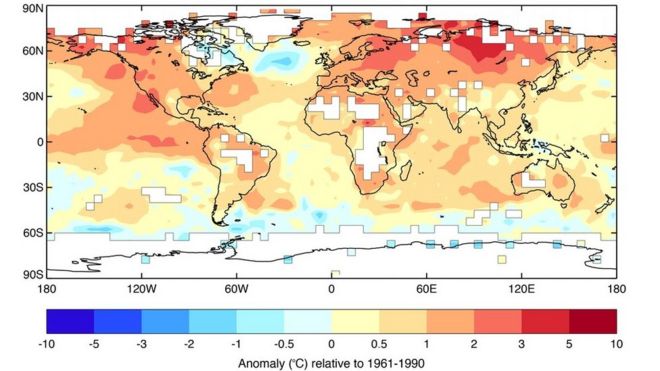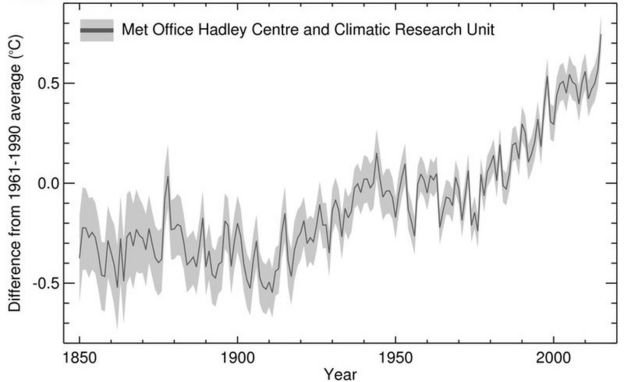Climate change: 2015 'shattered' global temperature record by wide margin
- 20 January 2016
- Science & Environment
 Met Office
Met Office
Global temperatures in 2015 were the warmest on record, according to data published by meteorologists in the UK and US.
The Met Office figures show that 2015 was 0.75C warmer than the long-term average between 1961-1990.
US data suggests that 2015 "shattered" the temperature record by the widest margin ever recorded.
Experts say the record temperatures were due to a combination of El Niño and human-induced warming.
Data produced by the US space agency (Nasa) and the National Oceanic and Atmospheric Administration (Noaa) show that 2015 "shattered" the previous record set in 2014 by 0.13C.
According to Noaa, the increase in temperature over land and ocean surfaces between 2014 and 2015 was the largest margin by which the record has been broken.
Big jump
The fact that 2015 was going to break records had been heavily trailed by research agencies all over the world.
The Met Office predicted that 2015 would be between 0.52 and 0.76 above the long-term average. The actual temperature came in near the top end of that forecast.
"Looking ahead, 2016 looks like it's also going to be another warm year and that's associated with the fact that human influence on the climate through greenhouse gas emissions has pushed us into new territory," said Dr Peter Stott from the British meteorological organisation's Hadley research centre.
 Met Office
Met Office
"We're much warmer than we were and then we've got the continuing effects of El Niño in the Pacific Ocean as well."
US experts agreed that the key reasons for 2015's record figures were a long-term trend of warming, mainly caused by the burning of fossil fuels, combined with the El Niño weather event.
"The reason that 2015 has not just broken the record but has blown past it is because we are seeing a long-term temperature trend interact with the strongest El Niño of our generation," said Prof Katharine Hayhoe, director of the climate science centre at Texas Tech University.
"What we have this year is the long-term rate of change with an extra spike of El Niño on top," she told BBC News.
2015 also was the first full year to break the 1C barrier above pre-industrial levels - a key benchmark for warming. Politicians from all over the world meeting in Paris last December promised to keep the global rise in temperatures "well below 2 degrees, in a bid to avoid dangerous climate change.
Much of the warming has happened in the past 35 years, says Nasa, with 15 of the 16 warmest years on record occurring since 2001.
According to Noaa, 2015 is the fourth time an annual global temperature has been set this century. 2015 also saw record high temperatures for 10 months, with five months showing the highest departure from the average of any month on record.
And Dr Thomas Karl, who directs the administration's National Centers for Environmental Information, said current conditions would likely lead to 2016 being as warm as - if not warmer than - 2015.
"In December and recent months in the autumn, records were broken by a substantial margin - much stronger than what we had seen earlier in the year. And it's going to be very difficult for that not to continue into at least the first part of next year because, in particular, the ocean temperatures are so warm," Dr Karl explained.
Pause paused?
Many parts of the world have experienced unusual weather patterns throughout 2015, which experts believe are in line with their expectations of the impacts of warming. There have been severe droughts in parts of Africa, in India and Pakistan, while flooding hit many parts of Europe and the US later in the year.
"The end of 2015 was very exceptional in many ways. Here in the UK we had both the wettest and the warmest December in our records going back to 1910, but also globally," said Dr Stott.
"We saw very warm temperatures in Siberia and Northern Russia and on the east coast of North America as well.
"Part of that globally is associated with El Niño, but if we step back we can also see weather events that are consistent with an on-going pattern of a warmer climate with a greater risk of heatwaves and droughts."
Climate sceptics had made much of the fact that the increase in global temperatures seemed to stall around 1998. Researchers say the latest figures underscore the fact that the hiatus is over.
"The idea of a pause in warming in the scientific community has been roundly refuted," said Prof Hayhoe.
"We know that climate change is measured over 20-30 years at least, and it's measured over that timeframe specifically because we have natural variability. When we look over 20-30 years and longer climate timescales, we see that global warming continues unabated."
This point was echoed by Dr Gavin Schmidt, from the Goddard Institute for Space Studies, which oversees the Nasa data record.
"The reason why this is such a warm record year is because of the long-term warming trend, and there is no evidence that that warming trend has slowed, paused, or hiatused at any point in the last few decades," he told reporters.
Follow Matt on Twitter @mattmcgrathbbc.
Comments